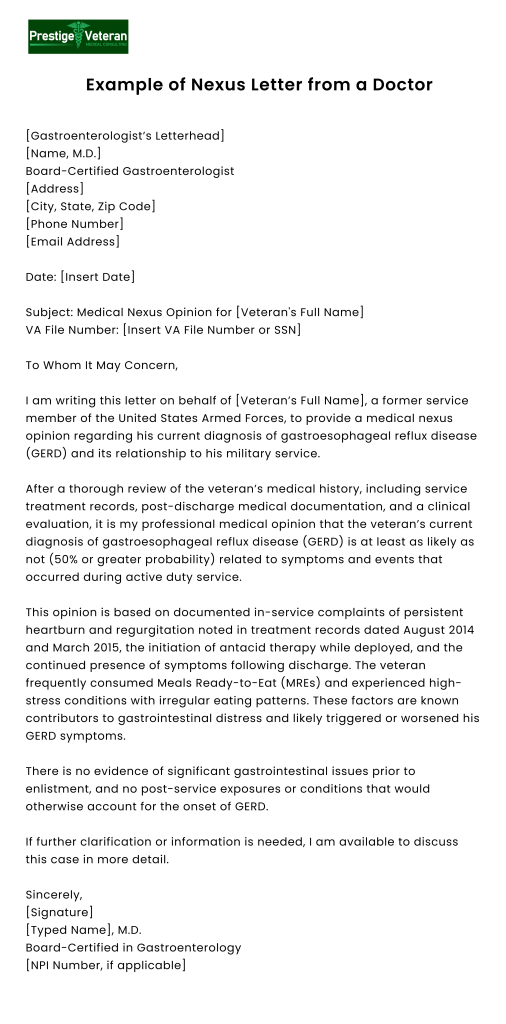If you are a veteran struggling to get a nexus letter for your VA disability claim, you are not alone. Though this medical evidence is often essential for establishing a service connection, many physicians or private doctors refuse to write one. This blog explores exactly why that happens and, more importantly, what you can do about it. From seeking help from independent medical providers to VA-accredited attorneys, we will guide you through how to get a nexus letter to strengthen your VA claim.
Table of Contents
What Is a Nexus Letter for VA Disability Claims?
A nexus letter (or medical nexus letter) is a written statement from a qualified medical professional that clearly links a veteran’s current medical condition to their military service.
This medical document is particularly helpful when:
- The service connection isn’t obvious or direct
- A veteran is applying for secondary conditions they have struggled to connect (e.g., migraines secondary to tinnitus or sleep apnea secondary to PTSD)
- A veteran is appealing a previously denied VA claim and needs stronger medical evidence
Essentially, this expert opinion answers the critical question: “Is it at least as likely as not (50% or more) that this condition was caused or aggravated by military service?”
Without a medical nexus, the VA often has no medical justification to connect your service to your current condition, leading to claim denials or delays for months, if not years. It is always important to remember that while a medical nexus, of link between service and an injury or illness, is always required, it does not have to come in the form of an official letter. The VA can often provide a positive nexus at the compensation and pension exam. A nexus can also be a simple statement from a treating doctor in a healthcare note.
Why Your Doctor is Refusing to Write a Nexus Letter
Getting a nexus letter for VA disability can be a frustrating experience when your treating doctor declines to help. Understanding why doctors refuse to give a medical opinion can help you approach the issue more strategically. Here are the main reasons this happens:
1. Lack of Familiarity with the VA Disability System
Many private doctors don’t know how to write a nexus letter or are unfamiliar with VA standards. They may not understand the required format or what language the VA looks for in a credible medical opinion.
2. Fear of Legal Liability
Some doctors worry that writing medical nexus letters might subject them to legal scrutiny, particularly if their opinion is challenged during a claim appeal or court case. They often choose to avoid involvement altogether in the VA claims process.
3. Time Constraints
Doctors already have packed schedules. Writing a strong opinion for service connection involves reviewing extensive medical and service records, writing a detailed explanation, and referencing clinical evidence. It’s time-consuming, and many providers simply can’t prioritize it.
4. VA’s Conflict of Interest Policies
If your doctor works within the VA healthcare system, they may mistakingly believe they are restricted from writing nexus letters, even if technically allowed. This is because VA doctors mistakenly believe that helping veterans with disability claims could create a perceived conflict between their roles as objective healthcare providers and as advocates in the VA claims process.
5. Unfamiliarity with Military Terminology
Many nexus letter providers do not understand VA medical terminology or service records, making it hard to confidently draw a connection between your current condition and your military service.
6. Lack of Confidence in Their Nexus Opinion
Some healthcare professionals are hesitant to write nexus letters for VA if they feel they don’t have enough supporting evidence or if the link between your condition and service is not immediately obvious.
7. Administrative or Institutional Barriers
In hospitals and clinics, policies may prohibit physicians from offering independent medical opinions that could influence a legal or benefits decision, even if they personally support your claim.
8. They Lack the Right Records
If your nexus letter doctor doesn’t have access to your complete military medical history or service treatment records, they may not feel comfortable providing an opinion.
What to Do If Your Doctor Won’t Write a Nexus Letter
If your primary care physician refuses to write a nexus opinion, remember, this is not a dead end. Veterans have successfully obtained service connection by turning to alternative resources and providers. You still have solid, actionable steps to take to move your VA claim forward.
1. Don’t Take It Personally
It can be disheartening when a doctor you have trusted for years says no to a request for a nexus letter for your VA disability claim. However, your doctor may not be refusing out of disbelief or lack of support. Often, they simply don’t have the time or knowledge to engage in the VA disability nexus process. Stay professional and move forward with a plan.
2. Understand What’s Helpful in a Nexus Opinion
First, make sure you understand what a strong nexus opinion from a doctor looks like. The key elements are:
- A clear medical opinion using phrases like “more likely than not”
- A detailed rationale supporting the connection
- Review of relevant medical and service records
- Specific references to how your condition developed or worsened due to service
You can look for sample nexus letters online to understand the structure. While there’s no official VA form, using a template can help ensure the final draft includes all the necessary details.
3. Use a Nexus Letter Template
Some primary care physicians are willing to help veterans, but just don’t know where to start. Supplying them with a detailed nexus letter template can make the process smoother. A well-structured template outlines the essential elements, such as medical background, diagnosis, service connection, and professional opinion, making it easier for doctors to write clear, supportive documentation. Offering a sample nexus letter can also guide them in crafting a strong, VA-compliant letter.
4. Seek Out Independent Medical Opinion (IMO) Providers
When your own doctor says no, turn to professionals who specialize in writing nexus letters for veterans. These are often independent medical opinion (IMO) services with doctors who are trained to evaluate service-related disabilities and write evidence-based opinions that meet VA requirements for nexus letters.
Working with a provider who understands the nexus letter format and how to phrase the medical opinion correctly increases your chances of receiving claim approval.
At Prestige Veteran Medical Consulting, doctors know how to properly link your military service to conditions like sleep apnea, tinnitus, PTSD, arthritis, mental health conditions, and more.
Our Independent Medical Examiners (IMEs) provide fully formatted nexus letters for VA claims written to to provide detailed and objective support.
5. Use Supporting Medical and Service Records
Even if your current provider won’t write a letter, consider improving your existing documentation and statements. A well-prepared claim without a nexus opinion may have a better chance than one with vague or inconsistent evidence. Start compiling supporting documents:
- Service treatment records
- VA Compensation and Pension (C&P) exam notes
- Private treatment records
- Peer-reviewed research connecting your condition to service exposure (e.g., noise-induced hearing loss and tinnitus)
- Buddy letters or lay evidence from family, coworkers, or friends
- Any prior VA rating decisions
Many doctors use this comprehensive package of documentation when drafting a VA nexus letter for veterans.
7. Try Requesting a Nurse Practitioner or Physician Assistant
If you are still wondering who can write a nexus letter for your VA claim, here are possible options. While most nexus letters are written by doctors (MDs or DOs), in some cases, a nurse practitioner (NP) or physician assistant (PA) may qualify.
These healthcare providers often work closely with doctors and may be willing to review your records and provide a well-supported nexus opinion, especially if they are familiar with your medical history.
8. Contact a VA-Accredited Attorney
Some attorneys who specialize in VA disability claims can connect you with qualified doctors. In certain cases, they may even advance the cost of the medical nexus letter if they believe in your case.
Example of a Nexus Letter for VA Claim
Below is an example of a nexus statement that supports a direct service connection in a VA disability claim.

How Much Does a Nexus Letter Cost?
While prices vary, a strong nexus letter for a VA claim from a reputable IMO provider typically ranges from $300 to $1,500, depending on case complexity and condition type. These nexus letter costs may feel expensive, but the potential back pay and ongoing monthly compensation can be tens of thousands of dollars. Always consider asing your treating provider and they may provide you a no cost letter.
How to Get a Nexus Letter for a VA Disability Claim?
- Collect your service records and private/VA medical records
- Write down a detailed personal statement describing your symptoms and history
- Contact a VA nexus letter doctor near you
- Submit documents and complete any assessments requested
- Review and approve the final letter before submission
Our medical experts at Prestige Veteran will craft a detailed and customized Independent Medical Opinion (IMO), using evidence and language that meets all VA standards.
We offer both standard and expedited services, with turnaround times as fast as 48 hours. Once completed, your medical nexus letter can be submitted directly through the VA.gov website, by mail, or via your accredited representative. We will guide you through every step of the VA claims process to ensure a smooth, stress-free experience.
Final Thoughts
While it’s discouraging when your doctor won’t write a nexus letter, it doesn’t mean your VA claim journey is over. Stay persistent, educate yourself on what makes a strong nexus opinion, and seek out qualified professionals who specialize in helping veterans.
Don’t wait to take action. Even if you have received a denied VA claim, a fresh, well-written medical opinion from an experienced provider can be the key to winning on appeal. Let one “no one” derail your claim. Because your VA disability benefits are worth fighting for.
FAQs
What should I do if my doctor refuses to write a nexus letter?
If your doctor won’t write a nexus letter, consider asking the VA or seek help from independent medical opinion (IMO) providers who specialize in medical opinions for VA claims.
Who can write a nexus letter?
Any licensed medical professional, such as a physician, physician assistant, nurse practitioner , or psychologist, can write a VA nexus letter.
Can someone besides a doctor write nexus letters?
Yes, in some cases, qualified nurse practitioners or physician assistants can write nexus letters.
What is a medical nexus letter vs. IMO?
A medical nexus letter is a term that is often used in the veteran community to describe an IMO, or an independent medical opinion.
Is it worth paying for professional nexus letters?
Yes, it often can be, because a well-written, evidence-based nexus opinion from a qualified provider can significantly increase your chances of VA claim approval and deserved benefits in some cases. It is always best to follow up with an accredited legal professional for best practices and strategy for your claim.
Also read: Understanding the Nexus Letter Success Rate for a VA Disability Claim
At Prestige Veteran Medical Consulting, a veteran-owned company, we specialize in Independent Medical Opinions (IMOs) known as Nexus letters.
Our purpose is to empower YOU, the veteran, to take charge of your medical evidence and provide you with valuable educational tools and research to guide you on your journey.
Understanding the unique challenges veterans face, our commitment lies in delivering exceptional service and support.
Leveraging an extensive network of licensed independent medical professionals, all well-versed in the medical professional aspects of the VA claims process, we review the necessary medical evidence to incorporate in our reports related to your VA Disability Claim.
Prestige Veteran Medical Consulting is not a law firm, accredited claims agent, or affiliated with the Veterans Administration or Veterans Services Organizations. However, we are happy to discuss your case with your accredited VA legal professional.















